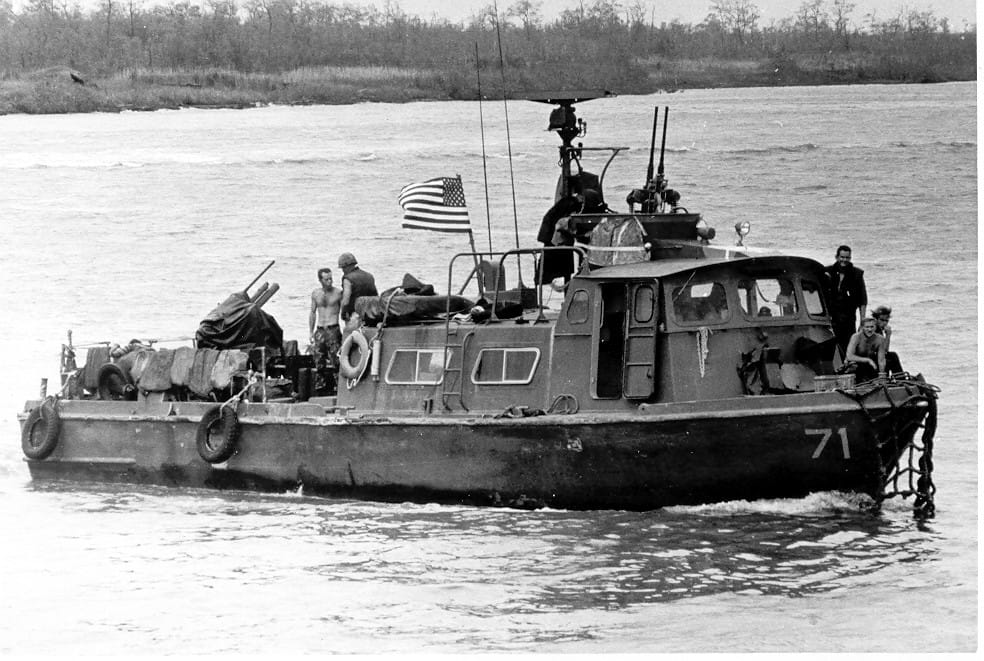swiftboat

To swiftboat a politician is to dishonestly call their former military service into question, to falsely accuse them of exaggerating or even lying about their combat experiences. The term arose in the context of the 2004 U.S. presidential campaign, in which Democratic candidate John Kerry was a Vietnam veteran, while the Republican candidate, incumbent President George W. Bush, had sat out the war years in the Texas Air National Guard. Kerry had served aboard a U.S. Navy “swift boat.”
Swift boats were small—by Navy standards—shallow-draft vessels, suitable for river and coastal operations, deployed mainly in the Mekong River delta. Francis Ford Coppola’s 1979 movie Apocalypse Now features a swift boat. I’ve found a mention of “swift boat” in a photo caption in the January 1966 issue of the Navy magazine All Hands:
“SWIFT BOAT” is name [sic] given to the new PCF (patrol craft, fast) 50-footers which arrived in Vietnam recently as part of the Coastal Surveillance Force.
And there is this mention of swift boats in Memphis, Tennessee’s Commercial Appeal of 16 February 1966:
At sea, a 50-foot-long Allied naval patrol vessel known as a “swift boat,” was destroyed by an underwater mine in the Gulf of Siam and casualties to its six-man United States crew were described as “heavy.”
Earlier examples, especially in Navy documents, undoubtedly exist.
Apocalypse Now aside, swift boats largely disappeared from American consciousness following the war, that is until the 2004 presidential campaign. During the campaign Kerry naturally touted his war record, which compared very favorably to that of his opponent. To counter this, Republicans launched the group Swift Boat Veterans for Truth, consisting of some 250 men who had served on swift boats in Vietnam and who supported Bush’s reelection efforts. The group accused Kerry of lying about his war record, in particular about the incidents where he was wounded. But the group had only one member who had actually served with Kerry, and that man had not been present when Kerry was wounded. The other members of Kerry’s crew all supported his election. The group went public on 4 May 2004, as reported by the Los Angeles Times:
A newly formed group of Navy Vietnam War veterans has joined the political fray over Sen. John F. Kerry’s military experience, demanding that the prospective Democratic presidential nominee release all his service records from the period he spent in Vietnam’s river battle zone.
Preparing to unveil a sharply worded letter today to Kerry from more than 200 veterans, the Swift Boat Veterans for Truth claims to represent a majority of Navy officers and enlisted men who served on the patrol boat detail that Kerry joined for nearly five months in 1968 and 1969.
By September, swift boat had been verbed. In her column in the New York Times on 5 September 2004, Maureen Dowd used the verb, but not directly in the context of Republican attacks on Kerry. Rather she deployed it while commenting on a remark Bush had made criticizing a New York Times column from 1948 that had been critical of Allied occupation policy in Germany:
The president distorted the columnist’s dispatch. The “moral crisis” and failure she described were in the British and French sectors. She reported that Americans were doing better because of their policy to “encourage initiative and develop self-government.” She wanted the U.S. to commit more troops and stay the course—not cut and run.
Mr. Bush swift-boated her.
The Manichaean Candidate’s convention was a brazen bizarro masterpiece. The case to sack John Kerry featured the same shady tactics.
The following year, swiftboating appeared again. This time as a response to critics of U.S. Representative John Murtha, a Democrat from Pennsylvania, who had been critical of the war in Iraq. From the Allentown, Pennsylvania Morning Call of 11 July 2005:
“I am appalled that the chicken hawk cowards who are swiftboating our heroic and decent men are allowed to get away with it,” wrote Charlie Karafotias of Titusville, Fla., who served in the Merchant Marine in World War II and later served in the Army.
“These … fanatics know that they can’t win any kind of rational debate, so they must destroy their opponent—‘swiftboat’ their critics,” wrote Monty Noland of Helena, Mont.
And swiftboating would again come to the fore in August 2024, with Republicans lying about Democratic vice-presidential candidate Tim Walz’s military service.
Discuss this post
Sources
All Hands, Bureau of Naval Personnel Career Publication, January 1966, 29. HathiTrust Digital Archive.
Braun, Stephen. “Navy Veterans Fire on Kerry.” Los Angeles Times, 4 May 2004, A21/1. ProQuest Historical Newspapers.
Carpenter, Paul. “Murtha Column Strikes a Chord in Many Areas.” Morning Call (Allentown, Pennsylvania), 11 July 2005, B1/1. ProQuest Historical Newspapers.
Dowd, Maureen. “Amnesia in the Garden.” New York Times, 5 September 2004, WK9/6. ProQuest Historical Newspapers.
“Fierce Battle of Rice Bowl Leaves 88 Viet Cong Slain—McNamara Sees Bigger War.” Commercial Appeal (Memphis, Tennessee), 16 February 1966, 1/8. ProQuest Historical Newspapers.
Photo credit: Unknown photographer, U.S. Navy, late 1960s. Wikimedia Commons. Public domain image.